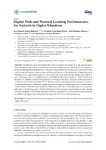Digital Tools and Personal Learning Environments: An Analysis in Higher Education

Use este enlace para citar
http://hdl.handle.net/2183/27035Colecciones
- Investigación (FEDU) [938]
Metadatos
Mostrar el registro completo del ítemTítulo
Digital Tools and Personal Learning Environments: An Analysis in Higher EducationAutor(es)
Fecha
2020Cita bibliográfica
García-Martínez, J.-A.; Rosa-Napal, F.-C.; Romero-Tabeayo, I.; López-Calvo, S.; Fuentes-Abeledo, E.-J. Digital Tools and Personal Learning Environments: An Analysis in Higher Education. Sustainability 2020, 12, 8180. Show more citation formats
Resumen
[Abstract] The effective use of Information and Communications Technology (ICT) and the discussion surrounding its educational contributions in formal settings are key elements in the analysis of personal learning environments (PLE). The aim of this study was to analyze the tools that students use to access information, create content, and share and interact in the framework of higher education. The study took a quantitative approach, using an ex post facto, transactional design. Data collection was via the application of a questionnaire to a stratified probabilistic sample (n = 1187) of university students on different courses at the National University (Costa Rica). Analysis of the data showed moderate use of tools in students’ PLEs. Students made more frequent use of resources aimed at accessing information, followed by applications for sharing and interacting, and, to a lesser extent, content creation. We also found significant differences in the use of tools depending on sex, previous education in technology, and academic performance. We recommend the inclusion of open, flexible learning strategies in university education which incorporate the various technological resources available in the digital era to ensure the development of PLEs and lifelong learning.
Palabras clave
ICT
Personal learning environment
Web 2.0
University students
Formal education
Higher education
Personal learning environment
Web 2.0
University students
Formal education
Higher education
Versión del editor
Derechos
Atribución 4.0 España






